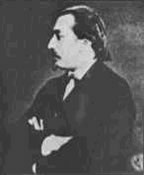Henryk WIENIAWSKI (1835-1880)
 One of the greatest performers of the 19th century, the Polish violonist/composer HENRYK WIENIAWSKI, began his studies under Massart at the famous Paris Conservatory of Music.
One of the greatest performers of the 19th century, the Polish violonist/composer HENRYK WIENIAWSKI, began his studies under Massart at the famous Paris Conservatory of Music.
At the age of 13 the young virtuoso began a series of concert tours, including one to Russia with his brother, a pianist. He also published a number of important works before he was 18.
Wieniawski was appointed violonist to the Tsar of Russia and accepted an invitation to join the staff of the St. Petersburg Conservatory of Music there, where he served from 1860 until 1972.
A long and exhausting concert tour of the United States with the pianist Anton Rubinstein was followed by an appointment as successor to Vieuxtemps at the Brussels Conservatory of Music in Belgium where he taught until 1877.
At the same time he continued his concert tours to such places as Prague, Budapest, Poland, London, Berlin and Russia, which were eventually brought to an end by ill-health and his death in Moscow in 1880.
He played what he thought was an Amati violin. This violin was later sold to the great violonist Hubay who correctly identified it as being the work of Petrus Guarnerius.
Wieniawski wrote Il faut risquer (French for „it is necessary to risk“) in red across difficult passages. He played with a high and angular right elbow, with his first finger touching above the second joint on the bow. The great violin pedagogue Carl Flesch later referred to it as the Russian grip. Wieniawski produced a rapid staccato by tensing his right shoulder. He was also known for his rich and expressive vibrato. Like Paganini, Wieniawski was the archetype of the romantic virtuoso whose approach and techniques have become important aspects of modern playing.
Wieniawski’s compositions (23 survived, all for violin) were written with his own performances in mind. He wrote two important books of etudes (or studies), L’Ecole moderne pour violin seul (The Modern School for Solo Violin) and Etudes Caprices, op. 18. Other important works include his Souvenir de Moscou, Le carnaval russe, Legends, op. 17, polonaises and mazurkas and two violin concertos.

